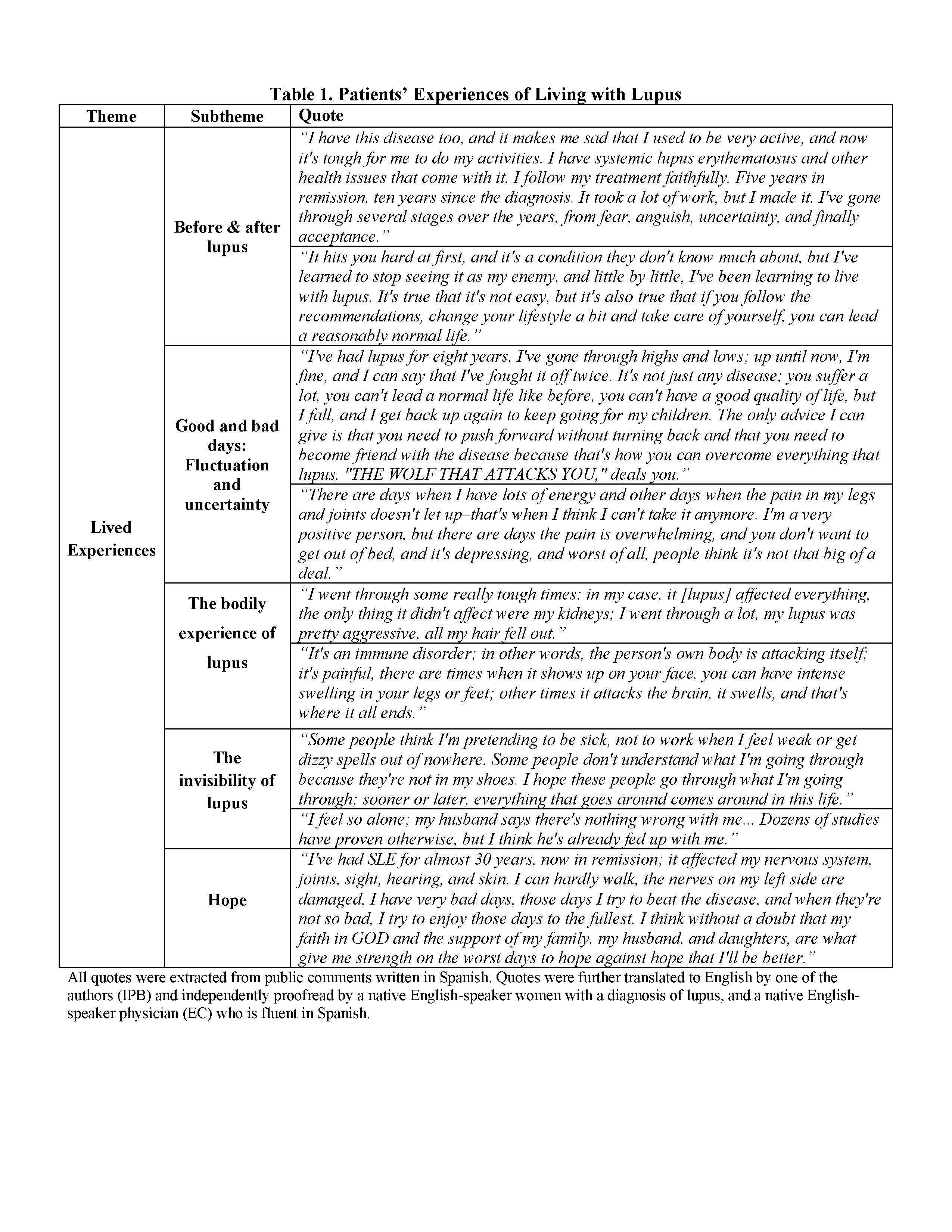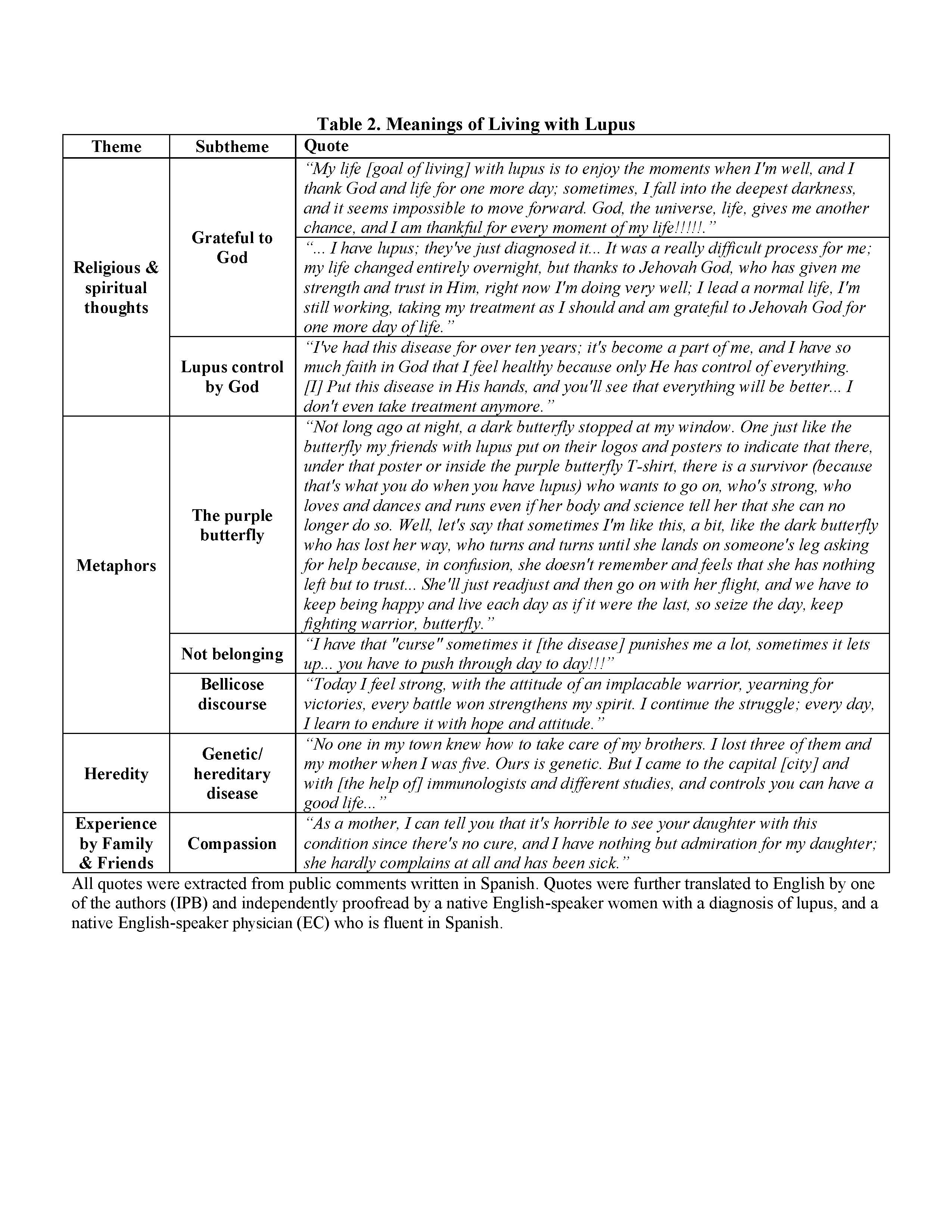Session Information
Session Type: Poster Session C
Session Time: 8:30AM-10:30AM
Background/Purpose: SLE disproportionately affects Latin Americans, and outcomes are worse amongst them compared to non-minority populations. Understanding patients’ views of living with SLE is critical to provide proper care and inform culturally competent self-care education programs. However, little is known about illness experiences and perspectives among Latin Americans with lupus. This qualitative study describes the lived experiences and perceived meanings regarding lupus, which have been shared by Latin American patients and their relatives on an open Facebook page.
Methods: Let’s Talk About Lupus (Hablemos de Lupus) is a public Facebook page that provides reliable and culturally competent education to Spanish speakers living with lupus. Launched in May 2017, the page has gathered nearly 100,000 followers by May 2021. Users often share their stories, questions, and thoughts organically with peers and a team of rheumatologist educators. For this study, we used the Facepager application to extract de-identified narratives posted as a reaction to the most popular resources published within the first 2 years (6 animated videos and 6 patients’ testimonials). We conducted a thematic analysis using ATLAS.ti v8, with further triangulation to verify concordance and aid in an interpretative medical anthropology framework.
Results: We analyzed 1717 independent comments. Five core themes emerged: lived experiences of lupus (Table 1), religious/spiritual thoughts, lupus metaphors, lupus heredity, and family/friends’ experiences (Table 2). Being diagnosed with lupus is perceived as a life-changing event. The fluctuating course of the disease causes uncertainty among patients, and the perception of invisibility within the patient’s social circle generates feelings of being misunderstood. Faith and spiritual thoughts are used to cope with living with lupus. Patients use metaphors to communicate the disease’s meaning and their lived experiences (e.g., the purple butterfly, not belonging, a hidden enemy, and bellicose discourse). The lupus experience extends to the family, and relatives are negatively impacted by their loved one’s suffering.
Conclusion: Latin American patients experience lupus as an unpredictable condition that brings about suffering trajectories to patients, relatives, and friends. Inheriting lupus is a concern shared by patients and families. Patients use metaphoric language to foster empathy and sympathy within their social context. Metaphors are also used to overcome the challenges in communicating the illness experience, which many perceive as an ‘invisible illness.’ Religion is as important as medical treatment in coping with the disease. These findings can be used to improve physician-patient communication and public health campaigns to serve Latin Americans with lupus.
To cite this abstract in AMA style:
Colmenares-Roa T, Gastelum-Strozzi A, Crosley E, Fuentes-Silva Y, Reategui-Sokolova C, Elera-Fitzcarrald C, Ibañez S, Cairoli E, Pons-Estel B, Peláez-Ballestas I, Drenkard C. Experiences and Finding Meaning Among Latin Americans Living with Lupus: Learning from Social Media Narratives by Patients and Their Social Network [abstract]. Arthritis Rheumatol. 2021; 73 (suppl 9). https://acrabstracts.org/abstract/experiences-and-finding-meaning-among-latin-americans-living-with-lupus-learning-from-social-media-narratives-by-patients-and-their-social-network/. Accessed .« Back to ACR Convergence 2021
ACR Meeting Abstracts - https://acrabstracts.org/abstract/experiences-and-finding-meaning-among-latin-americans-living-with-lupus-learning-from-social-media-narratives-by-patients-and-their-social-network/


